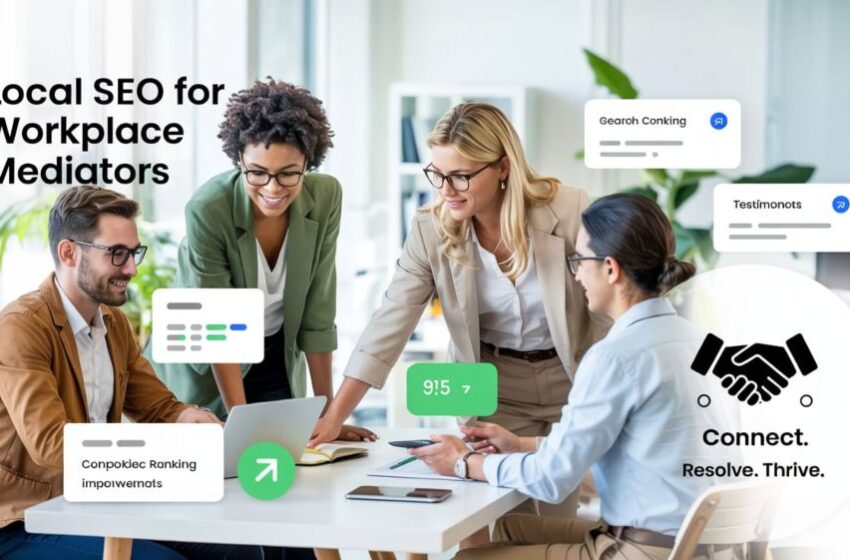
Local SEO for Workplace Mediators: Boosting Visibility and Client Engagement
For workplace mediators, visibility is everything. With more than 87% of consumers using Google to evaluate local services, your online presence could be the deciding factor in whether a company reaches out or never even knows you exist.
Local SEO helps you stand out from the crowd. It ensures your name appears when local HR professionals, managers, or business owners search for “workplace mediator near me.” That kind of digital spotlight isn’t luck—it’s strategy.
By focusing on location-specific keywords, updating your Google Business Profile, and creating content that directly addresses your audience, you can build trust, relevance, and reach. The result? More inquiries, stronger community ties, and a thriving practice built on real local connections.
This blog will show you how. From simple SEO tweaks to meaningful messaging, you’ll learn how to turn online searches into real-world mediation opportunities—right in your backyard.
Key Takeaways
- Local SEO enhances visibility for workplace mediators.
- A targeted content strategy effectively engages potential clients.
- Optimizing for location-specific searches fosters community connections.
Understanding Local SEO for Mediators

Local SEO is crucial for mediators seeking to boost their online presence in specific geographic areas.
This approach enables them to connect more effectively with potential clients searching for mediation services in their area.
Benefits of Local SEO for Mediation Practices
Implementing local SEO offers numerous advantages for mediation practices. It helps to increase visibility in local search results, meaning that potential clients are more likely to find a mediator when they search for terms like “mediators near me.”
A focused strategy can lead to higher website traffic and improved client engagement.
Additionally, local SEO establishes credibility, as a well-optimized online presence often signals reliability and professionalism. This can set a mediation practice apart in a competitive market.
Furthermore, utilizing local SEO services from an experienced local SEO agency could help streamline the optimization process, making it more efficient. These services can lead to greater overall growth for the practice.
Key Local SEO Strategies
To effectively implement local SEO, mediators should focus on several key strategies.
First, creating and optimizing a Google My Business listing is essential. This listing provides important information like location, hours, and services, increasing visibility.
Next, it is crucial to incorporate local keywords into your website’s content. Phrases like “mediation services in [City Name]” or “local mediation expert” help improve search rankings.
Moreover, gathering positive reviews from clients can enhance credibility. Online reviews can significantly influence a potential client’s decision-making process.
Finally, utilizing local backlinks from relevant directories or businesses strengthens the site’s authority.
A local SEO company can help mediators identify these opportunities, ensuring a comprehensive approach to standing out in their community.
The Role of Workplace Mediators
Workplace mediators play a crucial part in resolving conflicts within organizations. They facilitate communication between parties and foster an environment conducive to resolution. Their skills and ability to navigate challenges have a significant impact on workplace dynamics.
Skills Critical to Mediation
Successful workplace mediators possess several key skills. Active listening is essential, allowing mediators to understand the concerns of both parties fully. This skill ensures that all viewpoints are acknowledged and considered.
Effective communication is another critical skill. Mediators must convey complex ideas clearly and neutrally, which helps prevent misunderstandings.
Additionally, they require strong empathy to appreciate the emotional aspects of conflicts, making parties feel valued.
Lastly, problem-solving abilities enable mediators to guide discussions toward constructive solutions. With these skills, mediators can effectively bridge gaps between employees and employers, leading to resolution.
Challenges in Workplace Mediation
Workplace mediation presents unique challenges that mediators must navigate. Power imbalances often exist, where one party may dominate discussions, resulting in unequal opportunities for expression.
Another significant issue is emotional volatility. Conflicts can evoke strong feelings, hindering rational dialogue. Mediators must manage these emotions to facilitate a calm environment.
Resistance to mediation can also arise, particularly if parties view it as an admission of weakness. Overcoming this skepticism is a vital aspect of the mediator’s role.
Furthermore, organizational culture impacts mediation outcomes. Understanding and adapting to different workplace cultures is essential for successful resolution.
Developing a Content Strategy
A well-defined content strategy is crucial for workplace mediators to engage their audience effectively. It incorporates tailored messaging and industry-specific language to enhance visibility and connections with potential clients.
Content Tailored for Mediation Services
Creating content tailored to mediation services helps address the unique needs of clients. This includes articles, blog posts, and case studies that illustrate various mediation scenarios and outcomes.
Workplace mediators can focus on topics like conflict resolution techniques, the benefits of mediation in the workplace, and success stories.
This targeted approach maximizes audience engagement and establishes the mediator’s authority in the field.
Utilizing diverse formats, such as videos, infographics, and webinars, can enhance comprehension of complex mediation concepts.
Regularly updating content ensures relevance, showcasing the mediator’s commitment to ongoing learning and adaptability in a dynamic environment.
Incorporating Mediation Terms and Language
Using industry-specific terminology enhances credibility and makes the content more relatable. Incorporating mediation language, like “facilitative mediation” or “interest-based negotiation,” can effectively resonate with the target market.
It is also important to explain these terms clearly, ensuring accessibility for individuals unfamiliar with the jargon. Online resources such as glossaries or FAQ sections can foster understanding.
Marketing efforts should emphasize diversity and equity, addressing how mediation services can bridge gaps in workplace communication and foster inclusive environments.
Language that reflects these values not only attracts clients but also aligns the mediator’s brand with contemporary workplace standards.
Optimizing for the ‘Near Me’ Searches
Local SEO is crucial for workplace mediators seeking to appear in “near me” searches.
Effective strategies can significantly enhance their visibility and connect them with clients who are searching for mediation services in their vicinity.
Building Local Online Presence
A strong local online presence begins with a well-optimized Google Business Profile. This profile should include accurate contact information, operating hours, and a clear and compelling description of the services offered. Adding high-quality images can attract more attention and establish trust.
Incorporating local keywords, such as “workplace mediation near me,” throughout your website content improves search rankings. Location-based landing pages can also effectively target specific communities.
Engaging on social media platforms complements your online presence. Sharing relevant content and interacting with community members fosters relationships and increases brand awareness.
Managing Local Citations and Reviews
Managing local citations involves ensuring that consistent business information is maintained across various online directories.
This consistency builds credibility for the mediation practice and enhances its visibility in local search results. Key platforms include Yelp, Yellow Pages, and other local business directories.
Accumulating positive reviews is crucial. Encouraging satisfied clients to leave testimonials helps establish a strong reputation. Responding to reviews, both positive and negative, shows responsiveness and professionalism.
Utilizing tools to monitor these citations and reviews enables timely updates and management.
This proactive approach can improve rankings in local searches, making it easier for potential clients to find mediation services nearby.
Improving Client Relations and Experience
Creating positive experiences for clients is essential for workplace mediators.
Enhancing client relations involves building trust, demonstrating emotional intelligence, and fostering collaboration to effectively address their needs.
Implementing strategies for long-term relationships and effectively handling difficult situations can significantly improve the overall customer experience.
Strategies for Long-Term Client Relationships
Building long-term client relationships requires a proactive approach.
Mediators should prioritize frequent communication to ensure clients feel valued and informed. Regular check-ins can help maintain rapport and provide additional support.
Utilizing feedback mechanisms is crucial.
This could involve client satisfaction surveys or follow-up conversations to gauge their experience. Actively seeking input reinforces the mediator’s commitment to improvement.
Investing in emotional intelligence is also vital.
Understanding clients’ feelings and perspectives allows mediators to tailor their approaches, fostering deeper connections.
By demonstrating empathy, they can navigate challenges more effectively, leading to improved client satisfaction.
Dealing with Difficult Scenarios
Difficult scenarios are inevitable in mediation. Problem-solving skills become essential in these moments. Mediators should first acknowledge the emotions involved and create a safe space for open dialogue.
This approach can de-escalate tensions and encourage collaboration.
Active listening is key.
Mediators must fully understand each party’s concerns before proposing solutions. They should ask clarifying questions and summarize points to ensure all voices are heard.
Additionally, employing strategies to frame disputes in a positive light can guide clients toward more productive resolutions.
Encouraging a focus on common goals rather than individual grievances fosters a spirit of cooperation amid disagreements.
By managing difficult situations with confidence and skill, mediators can enhance the overall client experience.
Frequently Asked Questions
How can workplace mediators improve their visibility in local search results?
Workplace mediators can enhance local visibility by optimizing their Google Business Profile to the fullest, ensuring accurate information, relevant service categories, and regular updates. Adding local keywords to website content and publishing location-specific blogs or landing pages helps connect with nearby clients.
What are effective local SEO strategies for conflict resolution professionals?
Create landing pages for each city or region served. Use geo-targeted keywords in page titles, service descriptions, and blog posts. Build partnerships with local organizations, speak at community events, and get listed in local directories to increase authority and relevance.
What are the top local SEO ranking factors for small business service providers?
The three biggest factors are:
- Proximity: The distance between your business and the searcher.
- Relevance: How well your services match the query.
- Prominence: Online authority via reviews, backlinks, and citations.
Maximizing all three improves your chance of showing in local map packs and search results.
How important are online reviews for local SEO in the mediation industry?
Online reviews have a direct impact on rankings and client trust. A steady stream of positive reviews enhances your local visibility, while thoughtful review responses demonstrate professionalism. Google favors businesses with high reviews in its local search results.
How do local citations impact SEO for workplace mediators?
Local citations enhance your legitimacy in the eyes of search engines. Consistent listings of your business name, address, and phone (NAP) across Google, Yelp, LinkedIn, and local directories improve your authority and help boost local rankings.
What role does content marketing play for workplace mediators in local SEO?
Content marketing enables targeting local keywords and establishing trust with potential clients. Writing blog posts, case studies, or FAQs about workplace conflict resolution and linking them to specific locations boosts both engagement and local rankings.
Should workplace mediators use social proof and testimonials on their site?
Yes. Displaying local client testimonials and success stories builds credibility and supports SEO. Featuring positive feedback on city-specific pages or blog posts also boosts conversions and signals trust to both users and search engines.



